Note: place cursor on red asterisks for footnotes.
Place cursor on graphics for citation and further information.
Article MT276
"I don't know if this is actually a folk song"
The Life and Music of George Spicer (1906-1981)
Part 2: The West Langdon Years, 1928-35
Go to Part 1 Go to Part 3 Go to Part 4
When the noted singer George Spicer (1906-81) was 'discovered' by folk song collectors in the mid-1950s in the Ashdown Forest, he was claimed as one of Sussex's own. 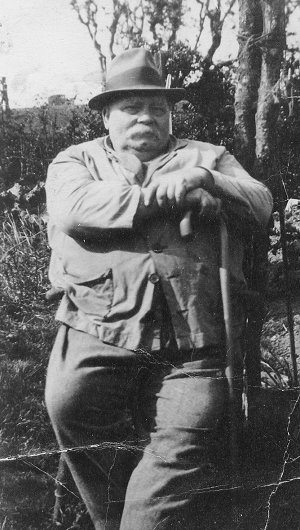 However, as was shown in Part 1 of these essays, he was born at Little Chart near Ashford in Kent, and lived the first thirty-three years of his life in that county before 'crossing the border'. This article explores the local canon during the years he spent as a cowman at Abbey Farm, West Langdon, from the singers he encountered during that period. On the recording Blackberry Fold on Topic Records published in 1974, Mike Yates says that the learning of George's songs progressed on from his initial experiences as a herdsman: I Wish There Were No Prisons came from Fred Morris of Martin Mill. George says he heard Three Jolly Boys sung by a trio in a pub in Northbourne, near Deal. "I only heard it the once and I had it. Never heard it sung anywhere else." Other pub singsongs resulted in George learning Henry my Son from Tommy Goodburn (sic), a regular of The Wheatsheaf, Martin; The Cunning Cobbler from Ike Harvey, landlord of The Rose, West Langdon, "who had the words on a broadsheet", and The German Clock Mender from a forgotten singer in Dover.
However, as was shown in Part 1 of these essays, he was born at Little Chart near Ashford in Kent, and lived the first thirty-three years of his life in that county before 'crossing the border'. This article explores the local canon during the years he spent as a cowman at Abbey Farm, West Langdon, from the singers he encountered during that period. On the recording Blackberry Fold on Topic Records published in 1974, Mike Yates says that the learning of George's songs progressed on from his initial experiences as a herdsman: I Wish There Were No Prisons came from Fred Morris of Martin Mill. George says he heard Three Jolly Boys sung by a trio in a pub in Northbourne, near Deal. "I only heard it the once and I had it. Never heard it sung anywhere else." Other pub singsongs resulted in George learning Henry my Son from Tommy Goodburn (sic), a regular of The Wheatsheaf, Martin; The Cunning Cobbler from Ike Harvey, landlord of The Rose, West Langdon, "who had the words on a broadsheet", and The German Clock Mender from a forgotten singer in Dover. 1 Although Mike Yates tried to locate some of these source singers, he succeeded in only tracing one: Jack Goodban, at his home in St Margaret's at Cliffe who, it transpired, was Tommy Goodban's son - a misspelling involved when transcribing the interview for publication. The challenge here was to find more using family history tools.
1 Although Mike Yates tried to locate some of these source singers, he succeeded in only tracing one: Jack Goodban, at his home in St Margaret's at Cliffe who, it transpired, was Tommy Goodban's son - a misspelling involved when transcribing the interview for publication. The challenge here was to find more using family history tools.
Resuming from Part 1 in which George had just married Dorothy Appleton in 1927, the sequence of events took the newly-weds from their lodgings at Newington to the north-west of Folkestone, to Langdon Abbey Farm, a kilometre and a half north-west of the village of East Langdon; the largest habitation in the district. His position as herdsman there was at the behest of businessman John Egerton Quested, although the farm was run on his behalf by a bailiff whose identity changed annually. Geographically, Abbey Farm lies five kilometers north of Dover on a crossroads between the villages of East Langdon, West Langdon, Whitfield and Sutton, on the site of a pre-Reformation abbey. This was a solely agricultural community, the nearest large village being East Langdon. West Langdon is a hamlet whose former pub is now a private farmhouse. Martin and Martin Mill are hamlets, the latter housing a railway station on the line connecting Dover and Ramsgate via Deal and Sandwich. St Margaret-at-Cliffe is a self-contained village to the east of the Dover-Deal main road (the A258). Whitfield is now a Dover suburb, straddling the A2 approach road to Dover Eastern Docks. In George Spicer's time the East Kent coalfields were in production near Northbourne to the north-west of Deal (the Betteshanger colliery), so the miners working there may have been factors subliminally inspiring George Spicer, who was in his mid twenties when his capacity for learning songs was at its height. 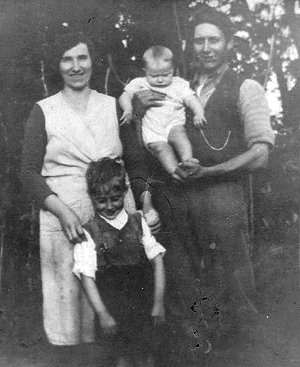 It was here when both George's sons were born: Ron in 1929, and Ken in 1934. One family anecdote as to the nature of George's work told by Ken relates to his driving a flock of sheep to the Stonar marshes north of Sandwich for their 'summer keep'. George drove a pony and trap with a trailer behind, and any lame sheep were brought on board so he and the flock could maintain a good pace. One scam for extra beer money was gained by removing these sheep temporarily from the trailer as those on foot were exempt from charges at the Sandwich tollgate crossing the Great Stour. Ken Spicer owned that this story doesn't quite tally with his father's role as a cowman, but it displays the obvious scope of his employment.
It was here when both George's sons were born: Ron in 1929, and Ken in 1934. One family anecdote as to the nature of George's work told by Ken relates to his driving a flock of sheep to the Stonar marshes north of Sandwich for their 'summer keep'. George drove a pony and trap with a trailer behind, and any lame sheep were brought on board so he and the flock could maintain a good pace. One scam for extra beer money was gained by removing these sheep temporarily from the trailer as those on foot were exempt from charges at the Sandwich tollgate crossing the Great Stour. Ken Spicer owned that this story doesn't quite tally with his father's role as a cowman, but it displays the obvious scope of his employment.
Electoral registers and the trades directory Pike's Dover & District Blue Book tell us the Spicers lived at Forstall Cottages - one of a terrace of four on the farm. Their neighbours varied from year to year presumably depending on their contracts. Ron Spicer recalled one of these was called Smissen, which would have been Percy Smissen who was living there in 1935. Isaac James 'Ike' Harvey certainly had the tenure of The Rose Inn in 1927, but the licence had passed on from him two years later. 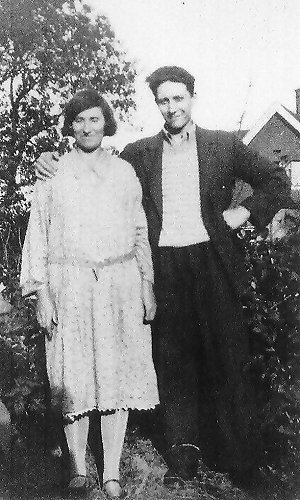 Of the other singers cited as sources: Thomas Charles 'Tommy' Goodban (1872-1945) was living with son John Wilfred 'Jack' Goodban and two more sons at 2 Martin Vale; and Frederick William Morris (1882-1960), who is recorded in electoral registers as living at no more specifically than just the nearby hamlet 'Martin'. Intriguingly, to cement a family relationship, the 1891 Census records that Fred was the stepson of Charles Goodban of East Langdon: the brother of Tommy Goodban.
Of the other singers cited as sources: Thomas Charles 'Tommy' Goodban (1872-1945) was living with son John Wilfred 'Jack' Goodban and two more sons at 2 Martin Vale; and Frederick William Morris (1882-1960), who is recorded in electoral registers as living at no more specifically than just the nearby hamlet 'Martin'. Intriguingly, to cement a family relationship, the 1891 Census records that Fred was the stepson of Charles Goodban of East Langdon: the brother of Tommy Goodban.
The actual transcript of the interview from which Mike Yates compiled his album notes continues: "I learnt Cock-a-Doodle-Doo from a pub in Dover. Well, I used to sing it with various chaps by joining in the 'cock ups' (in the chorus)
Pat Murphy? That was old 'Pudden' Carswell. He used to work at Penfold's Fair. I heard it sung (from someone) when he was drunk. He was born at Whitfield, near Dover." On the album notes, it says that German Clockmender came from 'a forgotten singer in Dover', although the interview transcript says the song came from "some chaps
from the Fox and Goose, Weavering Street, Maidstone, when I used to play darts for them." 2 Neither Cock-a-Doodle-Do nor Pat Murphy were included on Blackberry Fold, so the pub singer anomaly on the former song is partially explained due to this.
2 Neither Cock-a-Doodle-Do nor Pat Murphy were included on Blackberry Fold, so the pub singer anomaly on the former song is partially explained due to this.
Notwithstanding the anonymity of the Dover pub singer and Northbourne trio mentioned earlier, we now have the names of five more local singers other than family, from whom George Spicer gained his repertoire. Starting backwards the true identity of 'Pudden' Carswell is most likely Hubert Carswell (1901-1986) of Mill Cottages, Whitfield who, in the 1927 electoral register is cited as living with his parents, Alfred and Kate. Whitfield is only 3 kilometers south-west of Langdon Abbey Farm, and it's plausible that George Spicer was a visitor there. Like George, Carswell was a keen cricketer, playing both that and football for the village team in the latter's case: the similarity of their ages being the main reason for supposing their association. The Carswell family appear to have moved on from Whitfield shortly after 1931 as no mention of them is made in the electoral register after then, and Hubert's name is missing from newspaper cricket scorecards. Hubert's death was at Ash-next-Sandwich, 18 kilometers north of Whitfield. The only other clue is the reference to Penfold's Fair, which was held on The Meadow, somewhere near The Royal Oak at Whitfield. A former mayor of Dover, Diana Smallwood (born 1932), lived there as a child, her grandfather John Goldsach Sayer being the licensee. She herself recalls standing 'on the bar and sing(ing) although she was only one year old at the time.' 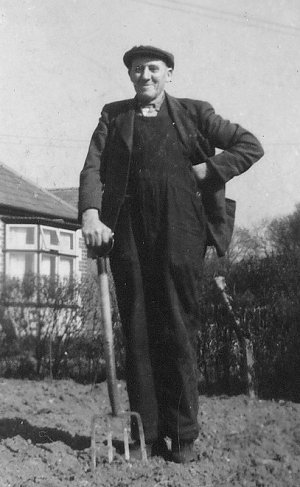 Penfold's Fair itself had 'swinging boats and numerous stalls', and that The Meadow was the place where sports events were held.
Penfold's Fair itself had 'swinging boats and numerous stalls', and that The Meadow was the place where sports events were held. 3
3
The local newspaper The Dover Express is useful for citing some of the other activities of these singers in the area. For example, at the East Langdon Flower Show in August 1934 organised by the local Cottage Gardeners' Society, a T Goodban, F Morris, and G Spicer were listed as prizewinners, with a Mr T Smissen, J Smissen and F Morris as stall holders. At a similar event held in December 1928, T Goodban tied for first prize at the East Langdon Gardeners' Society. 4 Other clues that might have been hoped for from the local press are absent, by way of direct references to smoking concerts and darts matches, with only George Spicer's name occasionally appearing in scorecards for the East Langdon cricket club as testimony to his acknowledged love of the sport.
4 Other clues that might have been hoped for from the local press are absent, by way of direct references to smoking concerts and darts matches, with only George Spicer's name occasionally appearing in scorecards for the East Langdon cricket club as testimony to his acknowledged love of the sport.
As noted earlier, the 1881 Census states that Fred Morris was the stepson of Charles Goodban of East Langdon, the brother of Tommy Goodban. His obituary in the Dover Express states that he lived at Fairview Bungalow, Martin, and was a railway worker for 40 years, and tributes also came from the local Gardeners' Society and British Railways. 5 Today, The Wheatsheaf public house is The Old Lantern Inn, having changed its name in 1976. Geographically, it lies one kilometer from Langdon Abbey Farm; however, the distance is doubled when approached on road. During George Spicer's time there, its licensee changed three times, but doesn't add to the story enough to say that George met and shared a song with the Goodbans, and possibly Fred Morris at this venue.
5 Today, The Wheatsheaf public house is The Old Lantern Inn, having changed its name in 1976. Geographically, it lies one kilometer from Langdon Abbey Farm; however, the distance is doubled when approached on road. During George Spicer's time there, its licensee changed three times, but doesn't add to the story enough to say that George met and shared a song with the Goodbans, and possibly Fred Morris at this venue.
Mike Yates attempted to locate some of those named by George Spicer in his 1977 interview, but this was proving difficult as time progressed. As he said, 'Sadly, only Jack Goodban was still alive, and his repertoire, though extremely interesting, was small. When we first met, Jack was helping a neighbour put up fence poles in a field that bordered the top of the famous White Cliffs. When I mentioned old songs, Jack asked if I was from the BBC, adding that they had written to him in the '50s to say that they would like to record him. Sadly though, they never turned up! To begin with, Jack denied any knowing any songs at all and it was only as I turned to leave that he said "You mean those old 'historical' songs
like The Shannon Frigate?" If anything was guaranteed to stop me dead in my tracks, then it was a comment such as that. Jack, like George and so many other singers that I have known, was a keen gardener and these recordings were made in the kitchen as his wife sat quietly salting runner beans into large earthernware pots. Jack, it turned out, had also sung in The Wheatsheaf at Martin, where his father sang and taught him The Shannon Frigate and The Aylesbury Girl, a song that was also sung by a couple of brothers called Wood.' 6 These two tracks first appeared on the album Green Grow the Laurels published in 1976 (Topic Records, 12TS285). Ironically, a check through the electoral registers of the day gives no reference any family called Wood living locally, so even that clue serves to frustrate.
6 These two tracks first appeared on the album Green Grow the Laurels published in 1976 (Topic Records, 12TS285). Ironically, a check through the electoral registers of the day gives no reference any family called Wood living locally, so even that clue serves to frustrate.
John Wilfred 'Jack' Goodban (1908-1988) lived at The Avenue in St Margarets-at-Cliffe. He was married to Dorothy Harvey, who predeceased him. The Wills and Administrations Indexes kept by The Probate Department of the Principal Registry of the Family Division currently held at First Avenue House in High Holborn, was key to finding more about the Goodban family, Fred Morris and Ike Harvey, as well as throwing a further name into the mix. 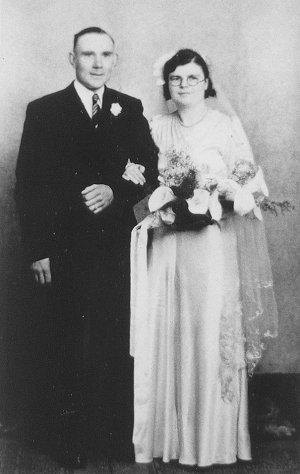 There were seven executors of Jack Goodban's will. When I made enquiries to each of these in December 1993, the information gleaned gave quite a lot of new data, including photographs. As will become evident, because of the interrelationships involved, it isn't easy to tell the story of one singer to the exclusion of the others, so most of what follows here is roughly in order of the replies received.
There were seven executors of Jack Goodban's will. When I made enquiries to each of these in December 1993, the information gleaned gave quite a lot of new data, including photographs. As will become evident, because of the interrelationships involved, it isn't easy to tell the story of one singer to the exclusion of the others, so most of what follows here is roughly in order of the replies received.
Jack's sister was Irene Granger of Shepherdswell, near Dover. She recalled her brother as being a cowman at Reach Farm, St Margarets-at-Cliffe, working from the War onwards for Gilbert Mitchell. However, although acknowledging his renown as a singer, could only recall him performing Paddy McGinty's Goat, adding that he 'would also be in demand at weddings and parties on account of this.' In the same letter, she related their mother used to sing The Faithful Sailor Boy with the chorus 'Farewell, farewell, my own true love, such parting brings me pain
' This is the only occasion we hear of Tommy's wife, Alice Louisa Goodban (1872-1958), as being a singer: whether she met George Spicer is unknown, despite the song being in his own repertoire, albeit learnt from his father-in-law Sidney Appleton. Mrs Granger also added that Jack often teamed up with the father of a Mrs Godwin who also used to live in St Margarets, giving me her address which I duly followed up. A second letter from Mrs Granger betrayed the fact that Ike Harvey was her maternal grandfather - so it seems that the relationships are compounded. She added that Thomas Goodban lived at The Vale in Martin Mill, and that The Lantern referred to in her letter was then The Wheatsheaf public house cited by Mike Yates.
One of Jack's nieces was Mrs Margaret (nιe Goodban) Bushell of East Studdal, a few kilometers west of West Langdon, and therefore a granddaughter of Tommy Goodban. Tommy's son Tom was a shepherd on the cliffs between Dover and St Margaret-at-Cliffe, adding that 'Uncle Jack was a cowman. Jack was always singing the old songs
Fred Morris lived next door to my parents. He died in 1960.' A second letter from Mrs Bushell added: 'My mother can remember Uncle Jack singing Don't Let your braces dingle dangle. Poor old sports, he got caught and dragged through the mangle. I think it is the chorus. And the other one, The Ring my Mother Wore." 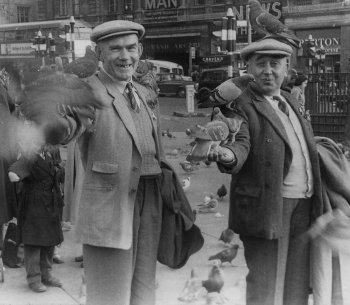 The assertion that Jack Goodban was also a cowman raises the possibility that he and George Spicer may have met at market or elsewhere, as well as at The Wheatsheaf at Martin during the time each lived in its immediate vicinity.
The assertion that Jack Goodban was also a cowman raises the possibility that he and George Spicer may have met at market or elsewhere, as well as at The Wheatsheaf at Martin during the time each lived in its immediate vicinity.
Mrs Jennifer Fletcher of St Margarets-at-Cliffe told me "Jack Goodban was my grandmother's brother
I know he appeared on Down Your Way on radio, and he had a record with featured two or three of his songs
He used to sing at local flower shows and gatherings, such as family weddings and parties. He worked as a farm labourer and then as a gardener at an Old Peoples' Home. He lived in this area all his life." Down Your Way appeared on national radio between 1946 and 1992, so it seems that the BBC did in fact call at sometime between 1976 and his death twelve years later, putting into context Mike Yates's information.
As mentioned earlier, I was alerted to a Mrs Godwin who lived in Dover, whose father joined Jack Goodban at some of the parties where was booked to sing. 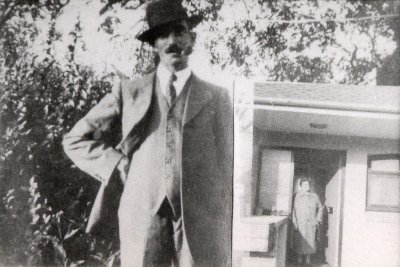 His name was Alfred James 'Alf' Claringbould who used to accompany himself on an accordion. Mrs Bushell says that her mother was also a Claringbould before she married George Goodban, so it seems that Alf and Jack were brothers-in-law. Claringbould was born at West Cliffe Farm near St Margarets, just off the Dover-Deal main road. I was told that he often sang If I was a Blackbird, The Old Battalion Drum (sic), To Be a Farmer's Boy, The Highwayman, Two Little Girls in Blue, and My Grandfather's Clock. He could also do a broom dance to the tune The Cat's Got the Measles. Ironically, the Claringboulds lived at Langdon Abbey Farm during the war, some six years after the Spicers had moved on, so their paths never crossed (or at least not recalled by Ron Spicer who would only have been 5 years old when they left the area). Farmer Quested was represented at the funeral, which is a double irony, bearing in mind he was George Spicer's one-time employer. Mrs Godwin noted that Alf used to sing and play at The Rose Inn, and local whist drives, dances and concerts, performing songs such as When They Sound the Last All Clear, When the Poppies Bloom Again, and Shall I Be an Angel, Daddy? Alf died at Langdon Abbey Farm in 1944 aged 49 years, so the period of his association with Jack Goodban must have been during the war years and/or just before then if no liaison with George Spicer is to be assumed - the reverse being equally plausible, but unrecorded.
His name was Alfred James 'Alf' Claringbould who used to accompany himself on an accordion. Mrs Bushell says that her mother was also a Claringbould before she married George Goodban, so it seems that Alf and Jack were brothers-in-law. Claringbould was born at West Cliffe Farm near St Margarets, just off the Dover-Deal main road. I was told that he often sang If I was a Blackbird, The Old Battalion Drum (sic), To Be a Farmer's Boy, The Highwayman, Two Little Girls in Blue, and My Grandfather's Clock. He could also do a broom dance to the tune The Cat's Got the Measles. Ironically, the Claringboulds lived at Langdon Abbey Farm during the war, some six years after the Spicers had moved on, so their paths never crossed (or at least not recalled by Ron Spicer who would only have been 5 years old when they left the area). Farmer Quested was represented at the funeral, which is a double irony, bearing in mind he was George Spicer's one-time employer. Mrs Godwin noted that Alf used to sing and play at The Rose Inn, and local whist drives, dances and concerts, performing songs such as When They Sound the Last All Clear, When the Poppies Bloom Again, and Shall I Be an Angel, Daddy? Alf died at Langdon Abbey Farm in 1944 aged 49 years, so the period of his association with Jack Goodban must have been during the war years and/or just before then if no liaison with George Spicer is to be assumed - the reverse being equally plausible, but unrecorded. 7
7
But it is Ike Harvey and the nature of music-making at The Rose Inn at West Langdon which bears the best fruit! 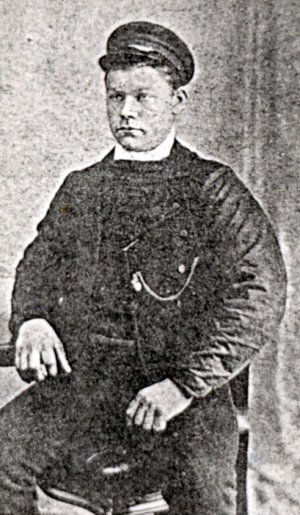 As a dwelling, there is little to West Langdon: a drive-through village, with a Victorian chapel, the former Rose Inn on the north side of the road through to East Studdal now being the pink-frontaged Old Rose Farm. Isaac James 'Ike' Harvey (1847-1947) was the licensee from 1900 until October 1929. Upon retirement, he had a bungalow built at Maydensole Farm only one kilometer west of the pub. The licence was then passed on to a Frederick Philpotts who held the post until 1943 - ironically, the licensee from 1953 to 1956 was a Frederick Claringbould, to compound the story further! The pub was formerly owned by the Bass Charrington brewery group, and closed for business in 1969. As an aside, The Wheatsheaf at Martin was licensed to an Alfred W Claringbould between 1950 and 1953, which begs another family interest although the namesake was no direct relation to the singer noted earlier.
As a dwelling, there is little to West Langdon: a drive-through village, with a Victorian chapel, the former Rose Inn on the north side of the road through to East Studdal now being the pink-frontaged Old Rose Farm. Isaac James 'Ike' Harvey (1847-1947) was the licensee from 1900 until October 1929. Upon retirement, he had a bungalow built at Maydensole Farm only one kilometer west of the pub. The licence was then passed on to a Frederick Philpotts who held the post until 1943 - ironically, the licensee from 1953 to 1956 was a Frederick Claringbould, to compound the story further! The pub was formerly owned by the Bass Charrington brewery group, and closed for business in 1969. As an aside, The Wheatsheaf at Martin was licensed to an Alfred W Claringbould between 1950 and 1953, which begs another family interest although the namesake was no direct relation to the singer noted earlier.
Mrs Patricia King is a grand-daughter of Ike Harvey and gave me information of his vital details. She recalled: 'I spent many hours with my grandfather who was always singing, but as I was only 11 years old when he died, I don't remember the words he sung
My grandfather had many friends with whom he visited The Rose Inn with after he left, especially (on) Saturday nights
'
My original chain of letters prompted conversations between Ike Harvey's grandchildren and Jack Goodban's relatives: some of whom weren't copied in the original mailshot. The fullest answer came from family 'archivist' David Harvey (born 1928) of Nuthall in Nottinghamshire, who started by reminiscing about George Spicer's family: "I can remember him (George Spicer) living and being employed at Langdon Abbey in the 1930s and, indeed, at the age of 2 or 3, I was clouted quite firmly with a shovel by Ronnie Spicer." Anecdotal, of course, as one is left with the image of a three year old boy clouting someone a year older harder than what probably was the case! Of Ike Harvey, he starts with the expression: "My grandfather - and I could write a book about him but, unfortunately, not his singing and songs
" Ike had seventeen children - not all of whom survived - accounting for the array of responses gained. He was obviously a man of enterprise, as Mr Harvey went on to say "At the turn of the century and during the first world war, he was also a carrier between West Langdon and Dover, and later bought at least one wood which he felled and sold for timber." He also acted as some kind of farmer or smallholder as "there was a decent sized piece of land attached to the pub, and he farmed various other fields in the area" some of which he rented from another farmer.
Despite disclaiming any knowledge of his or anyone else's music in the pub, Mr Harvey continued: "Now the music. George Spicer played the drums, and I believe, concertina as part of the music provided by my grandfather and his friends for the entertainment of customers. 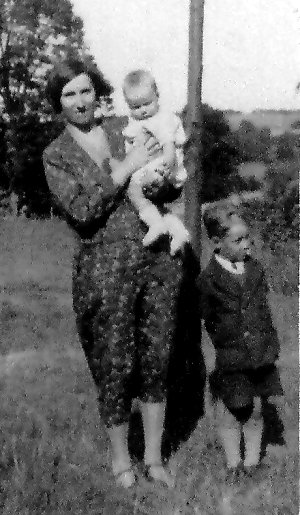 The bar area was so small that fifteen to twenty customers would fill it comfortably, though I don't think I ever saw it so full. At that time, I understand, George stuck to his playing and my grandfather did all the singing, mainly traditional and folk songs and music hall. He also played the concertina/accordion. Some of his song sheets survived for many years afterwards but, as time went by, they became torn and were disposed of
There were two songs we were able to recall - or at least (my brother) John was - though only pieces of them. One concerned the famous Folkestone Murder" (Mr Harvey then goes on to describe the narrative of the song)
"the second is believed to be a Northumbrian song about a butcher who, on his way to market, heard a woman's cry. After a search, he found the woman, naked, bent over to tend her, whereupon she produced a knife and killed him."
The bar area was so small that fifteen to twenty customers would fill it comfortably, though I don't think I ever saw it so full. At that time, I understand, George stuck to his playing and my grandfather did all the singing, mainly traditional and folk songs and music hall. He also played the concertina/accordion. Some of his song sheets survived for many years afterwards but, as time went by, they became torn and were disposed of
There were two songs we were able to recall - or at least (my brother) John was - though only pieces of them. One concerned the famous Folkestone Murder" (Mr Harvey then goes on to describe the narrative of the song)
"the second is believed to be a Northumbrian song about a butcher who, on his way to market, heard a woman's cry. After a search, he found the woman, naked, bent over to tend her, whereupon she produced a knife and killed him."
Mr Harvey recalled his grandfather 'vividly as a boy in the 1930s, listening surreptitiously outside Ike's door and listening to him talking to himself. The conversation would generally go something like this: "Come on, Ike, give us a song; What would you like? What about
? Right ho." He would then launch himself with gusto into song and accompany himself on his accordion.' The letter then describes Ike's character: 'My grandfather was a complete countryman of Kent. He had a largish moustache which could not escape a pint glass - in my experience, the beer at The Rose (Thompson's of Walmer, the brewers) was absolutely awful, but that was not while he was landlord. I have a photo taken in World War I when he grew a beard because his barber went into the army, and he waited for the barber's return to have it shaved off. Almost until his death, he went 'home' to The Rose every Saturday night, and latterly it was my father's job at 10 p.m. to collect him on one arm, and his bosom pal Jimmy Gregory, a Somerset miner, on the other, and pilot them safely back home, usually the worse for wear. Ironically, my father was a lifelong teetotaller.' Mr Harvey finally appends the words of a song called Irish Lass which he found written in pencil in Ike's handwriting, which I have included in the appendices.
Protocol of singing in The Rose was more or less understood. Mrs Granger, another of Ike's grandchildren relates: "Songs would be sung by the 'old men' (in the pub) and nobody else would dare sing another's song - until one of them died." Another grandson, Christopher Whitcomb remembered: "Ike singing his 'ditties' to customers and family alike, then lapsing into a mock-Yorkshire accent. One song had the line 'Jack jumped over the barn with a bundle of sticks'" which was sung when he was 6 years old.
Curiously, both Ron and Ken Spicer independently recalled visiting Ike 'at his pub' in Canterbury after the family left West Langdon between 1935 and 1939). Both say it was 'opposite the barracks', but neither recollect its name. 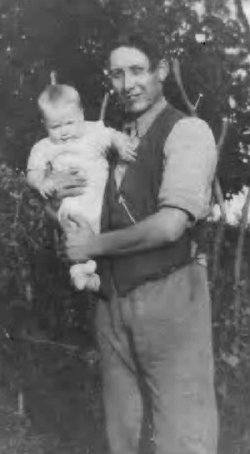 Neither trades directories nor the electoral registers of the day cite Ike as a landlord of any premises in Canterbury after he retired from The Rose in 1929, so it is assumed he was acting as some kind of 'locum' during another's absence or acting-landlord during an interregnum. Ken Spicer believes that Ike Harvey was also a godfather at his christening at West Langdon church.
Neither trades directories nor the electoral registers of the day cite Ike as a landlord of any premises in Canterbury after he retired from The Rose in 1929, so it is assumed he was acting as some kind of 'locum' during another's absence or acting-landlord during an interregnum. Ken Spicer believes that Ike Harvey was also a godfather at his christening at West Langdon church.
The Spicers left West Langdon around 1935. George told Mike Yates that many of his moves were due to 'farm failures', but Abbey Farm's existence under Alf Claringbould's tenure during the second world war belies this as the reason in this case. It is known that George read The Farmers' Weekly and Farmer and Stockbreeder and was always looking to better himself and his young family. Also, his innate volatility may have been another reason, especially if an unsympathetic bailiff or farmer Quested made his position untenable in austere pre-War Kent. Another factor may have been his father-in-law's move from Tom Broadley's farm at Lydden, about six kilometers to the west of Abbey Farm, to Oxenden Farm at Pedlinge near Westenhanger racecourse at around the same time. This in turn, may have been due to a 'farm failure', but Broadley was 77 years old at the time, but it's known he moved on to Postling Court Farm at Lyminge to the north of Hythe after leaving Lydden. Either way, the seven year experience at West Langdon proved another useful stepping stone in George Spicer amassing his considerable repertoire of songs when his mind was most fertile.
Notes on the Songs
A note is worthy of the song Three Jolly Boys which George learnt from an unknown trio in a pub at Northbourne. This hostelry can only have been The Hare and Hounds in the centre of the village, some six kilometers from Abbey Farm. It is supposed this wasn't one of George's regular haunts and a darts or cricket match may have been his reason for his being there. The song entails one singer performing a verse, with one of two stooges appending the 'aye, sir, aye' or 'no, sir, no' after each line, with all three singing the chorus. This has to be contrived if not rehearsed, and seems reminiscent of a smoking concert or revue turn rather than anything spontaneous in a standard pub sing-song. A printed version is found in More Tommy's Tunes: An Additional Collection of Soldiers' Songs, Marching Melodies, Rude Rhymes and Popular Parodies...; by Frederick Thomas Nettleingham (London: Erskine Macdonald, Ltd., 1918). Other collected versions have been located in Cambridgeshire by Russell Wortley; and in Lancashire by Harry Boardman.
The song containing the words: 'Jack jumped over the barn with a bundle of sticks' seems insoluble. Kevin McGrath suggests this may be based on doggerel around a 'Man in the Moon' rhyme, but one has to question when in his life Christopher Whitcomb heard this line, how accurately it was remembered, and whether or not it was just the once.
David Harvey's recollection of 'a Northumbrian song
' seems to tally with the Roxburghe Ballad The Three Butchers where the woman is the stooge for a highwayman, duping albeit plural travellers en route to market. I am grateful to a pseudonymous correspondent to the Mudcat Cafι forum for alerting me to this.
The second unfamiliar song that David Harvey wrote of is cited below in full, having been transcribed from a pencil-written note in the hand of Ike Harvey:
Irish Lass
It was in the town of Moligarde whisky rum and joy
Kissing all the pretty girls and bothering all the boys
I fell in love with a dark eyed girl from the town of Pat Makay
She soon got drinking something hot which didn't smell much like tay.
Chorus
Her hair was as black as a raven's wing her throat was like a swan
She was one of the finest Irish girls that ever the sun shone on
I axed her out upon the green to dance the Rocky Rue
And she fairly won of heart of Paddy MCCarey.
Her father is a farmer and he lives so mighty grand
In a little old mud cabin he's got horses cows and land
I axed my darling how she'd like to live with me for life
She said you've got the Blarney thanks (??) so I made her my own dear wife.
We live as happy as a king in a cottage by the lake
I never go our or roam about for my dear Norah's sake
We often go top Molidarde and I shan't forget the day
When I fell in love with this dark eyed girl from the town of Pat Makay.
"I have copied this as to spelling and punctuation, more or less as Ike wrote it" - David Harvey
I am indebted to Steve Gardham for pointing me towards the Bodleian Library ballads database under catalogue number 2806 b 11(182), where the song is found, published in 1872 with an extra verse, under the name Paddy Casey, the first line being ''Twas in town of Mullingar
' to the tune Down Along the Fields Haymaking. The differences are significant enough to surmise Ike Harvey's version was learnt orally to an otherwise unknown tune, or at least a blend learnt thus with something written down (e.g. the last line of the first verse in the Bodleian version 'that didn't smell like tay' contrasts with Ike's, but shares the poetic spelling of 'tea'.
Notes
(1) Sleeve notes of Blackberry Fold
(2) Transcript of interview between Mike Yates and George Spicer, 18th August 1977
(3) Dover Express, 12th March 2009; Dover Mercury, 19th March 2009
(4) Dover Express, 10th August 1934; Dover Express, 14 December 1928
(5) Dover Express, 4th March 1960
(6) Musical Traditions, Article MT099, Up in the North, Down in the South - Songs and Tunes from the Mike Yates Collection, 1964-2000 http://www.mtrecords.co.uk/articles/yates.htm
(7) Dover Express, 28th July 1944
Personal Communications
Ken Spicer, phone conversation, 15th June 2011
Irene Granger, phone conversation, 27th February 1994
Mrs Margaret Bushell, undated letter, 1994; 14th June 1994
Mrs Jennifer Fletcher, letter, 4th April 1994
Mrs Kath Godwin, letter 14th March 1994; interview, 26th July 1994
Mrs Patricia King, letter, 27th April 1994
David Harvey, letter, 27th May 1994
Irene Granger, letter, 27th February 1994
Christopher Whitcomb, phone conversation, 28th April 1994
Ron Spicer, interview, 18th July 1994
George Frampton - 12.10.12
Article MT276
Site designed and maintained by Musical Traditions Web Services Updated: 15.10.12
 However, as was shown in Part 1 of these essays, he was born at Little Chart near Ashford in Kent, and lived the first thirty-three years of his life in that county before 'crossing the border'. This article explores the local canon during the years he spent as a cowman at Abbey Farm, West Langdon, from the singers he encountered during that period. On the recording Blackberry Fold on Topic Records published in 1974, Mike Yates says that the learning of George's songs progressed on from his initial experiences as a herdsman: I Wish There Were No Prisons came from Fred Morris of Martin Mill. George says he heard Three Jolly Boys sung by a trio in a pub in Northbourne, near Deal. "I only heard it the once and I had it. Never heard it sung anywhere else." Other pub singsongs resulted in George learning Henry my Son from Tommy Goodburn (sic), a regular of The Wheatsheaf, Martin; The Cunning Cobbler from Ike Harvey, landlord of The Rose, West Langdon, "who had the words on a broadsheet", and The German Clock Mender from a forgotten singer in Dover.
However, as was shown in Part 1 of these essays, he was born at Little Chart near Ashford in Kent, and lived the first thirty-three years of his life in that county before 'crossing the border'. This article explores the local canon during the years he spent as a cowman at Abbey Farm, West Langdon, from the singers he encountered during that period. On the recording Blackberry Fold on Topic Records published in 1974, Mike Yates says that the learning of George's songs progressed on from his initial experiences as a herdsman: I Wish There Were No Prisons came from Fred Morris of Martin Mill. George says he heard Three Jolly Boys sung by a trio in a pub in Northbourne, near Deal. "I only heard it the once and I had it. Never heard it sung anywhere else." Other pub singsongs resulted in George learning Henry my Son from Tommy Goodburn (sic), a regular of The Wheatsheaf, Martin; The Cunning Cobbler from Ike Harvey, landlord of The Rose, West Langdon, "who had the words on a broadsheet", and The German Clock Mender from a forgotten singer in Dover. It was here when both George's sons were born: Ron in 1929, and Ken in 1934. One family anecdote as to the nature of George's work told by Ken relates to his driving a flock of sheep to the Stonar marshes north of Sandwich for their 'summer keep'. George drove a pony and trap with a trailer behind, and any lame sheep were brought on board so he and the flock could maintain a good pace. One scam for extra beer money was gained by removing these sheep temporarily from the trailer as those on foot were exempt from charges at the Sandwich tollgate crossing the Great Stour. Ken Spicer owned that this story doesn't quite tally with his father's role as a cowman, but it displays the obvious scope of his employment.
It was here when both George's sons were born: Ron in 1929, and Ken in 1934. One family anecdote as to the nature of George's work told by Ken relates to his driving a flock of sheep to the Stonar marshes north of Sandwich for their 'summer keep'. George drove a pony and trap with a trailer behind, and any lame sheep were brought on board so he and the flock could maintain a good pace. One scam for extra beer money was gained by removing these sheep temporarily from the trailer as those on foot were exempt from charges at the Sandwich tollgate crossing the Great Stour. Ken Spicer owned that this story doesn't quite tally with his father's role as a cowman, but it displays the obvious scope of his employment.
 Of the other singers cited as sources: Thomas Charles 'Tommy' Goodban (1872-1945) was living with son John Wilfred 'Jack' Goodban and two more sons at 2 Martin Vale; and Frederick William Morris (1882-1960), who is recorded in electoral registers as living at no more specifically than just the nearby hamlet 'Martin'. Intriguingly, to cement a family relationship, the 1891 Census records that Fred was the stepson of Charles Goodban of East Langdon: the brother of Tommy Goodban.
Of the other singers cited as sources: Thomas Charles 'Tommy' Goodban (1872-1945) was living with son John Wilfred 'Jack' Goodban and two more sons at 2 Martin Vale; and Frederick William Morris (1882-1960), who is recorded in electoral registers as living at no more specifically than just the nearby hamlet 'Martin'. Intriguingly, to cement a family relationship, the 1891 Census records that Fred was the stepson of Charles Goodban of East Langdon: the brother of Tommy Goodban.
 Penfold's Fair itself had 'swinging boats and numerous stalls', and that The Meadow was the place where sports events were held.
Penfold's Fair itself had 'swinging boats and numerous stalls', and that The Meadow was the place where sports events were held. There were seven executors of Jack Goodban's will. When I made enquiries to each of these in December 1993, the information gleaned gave quite a lot of new data, including photographs. As will become evident, because of the interrelationships involved, it isn't easy to tell the story of one singer to the exclusion of the others, so most of what follows here is roughly in order of the replies received.
There were seven executors of Jack Goodban's will. When I made enquiries to each of these in December 1993, the information gleaned gave quite a lot of new data, including photographs. As will become evident, because of the interrelationships involved, it isn't easy to tell the story of one singer to the exclusion of the others, so most of what follows here is roughly in order of the replies received.
 The assertion that Jack Goodban was also a cowman raises the possibility that he and George Spicer may have met at market or elsewhere, as well as at The Wheatsheaf at Martin during the time each lived in its immediate vicinity.
The assertion that Jack Goodban was also a cowman raises the possibility that he and George Spicer may have met at market or elsewhere, as well as at The Wheatsheaf at Martin during the time each lived in its immediate vicinity.
 His name was Alfred James 'Alf' Claringbould who used to accompany himself on an accordion. Mrs Bushell says that her mother was also a Claringbould before she married George Goodban, so it seems that Alf and Jack were brothers-in-law. Claringbould was born at West Cliffe Farm near St Margarets, just off the Dover-Deal main road. I was told that he often sang If I was a Blackbird, The Old Battalion Drum (sic), To Be a Farmer's Boy, The Highwayman, Two Little Girls in Blue, and My Grandfather's Clock. He could also do a broom dance to the tune The Cat's Got the Measles. Ironically, the Claringboulds lived at Langdon Abbey Farm during the war, some six years after the Spicers had moved on, so their paths never crossed (or at least not recalled by Ron Spicer who would only have been 5 years old when they left the area). Farmer Quested was represented at the funeral, which is a double irony, bearing in mind he was George Spicer's one-time employer. Mrs Godwin noted that Alf used to sing and play at The Rose Inn, and local whist drives, dances and concerts, performing songs such as When They Sound the Last All Clear, When the Poppies Bloom Again, and Shall I Be an Angel, Daddy? Alf died at Langdon Abbey Farm in 1944 aged 49 years, so the period of his association with Jack Goodban must have been during the war years and/or just before then if no liaison with George Spicer is to be assumed - the reverse being equally plausible, but unrecorded.
His name was Alfred James 'Alf' Claringbould who used to accompany himself on an accordion. Mrs Bushell says that her mother was also a Claringbould before she married George Goodban, so it seems that Alf and Jack were brothers-in-law. Claringbould was born at West Cliffe Farm near St Margarets, just off the Dover-Deal main road. I was told that he often sang If I was a Blackbird, The Old Battalion Drum (sic), To Be a Farmer's Boy, The Highwayman, Two Little Girls in Blue, and My Grandfather's Clock. He could also do a broom dance to the tune The Cat's Got the Measles. Ironically, the Claringboulds lived at Langdon Abbey Farm during the war, some six years after the Spicers had moved on, so their paths never crossed (or at least not recalled by Ron Spicer who would only have been 5 years old when they left the area). Farmer Quested was represented at the funeral, which is a double irony, bearing in mind he was George Spicer's one-time employer. Mrs Godwin noted that Alf used to sing and play at The Rose Inn, and local whist drives, dances and concerts, performing songs such as When They Sound the Last All Clear, When the Poppies Bloom Again, and Shall I Be an Angel, Daddy? Alf died at Langdon Abbey Farm in 1944 aged 49 years, so the period of his association with Jack Goodban must have been during the war years and/or just before then if no liaison with George Spicer is to be assumed - the reverse being equally plausible, but unrecorded. As a dwelling, there is little to West Langdon: a drive-through village, with a Victorian chapel, the former Rose Inn on the north side of the road through to East Studdal now being the pink-frontaged Old Rose Farm. Isaac James 'Ike' Harvey (1847-1947) was the licensee from 1900 until October 1929. Upon retirement, he had a bungalow built at Maydensole Farm only one kilometer west of the pub. The licence was then passed on to a Frederick Philpotts who held the post until 1943 - ironically, the licensee from 1953 to 1956 was a Frederick Claringbould, to compound the story further! The pub was formerly owned by the Bass Charrington brewery group, and closed for business in 1969. As an aside, The Wheatsheaf at Martin was licensed to an Alfred W Claringbould between 1950 and 1953, which begs another family interest although the namesake was no direct relation to the singer noted earlier.
As a dwelling, there is little to West Langdon: a drive-through village, with a Victorian chapel, the former Rose Inn on the north side of the road through to East Studdal now being the pink-frontaged Old Rose Farm. Isaac James 'Ike' Harvey (1847-1947) was the licensee from 1900 until October 1929. Upon retirement, he had a bungalow built at Maydensole Farm only one kilometer west of the pub. The licence was then passed on to a Frederick Philpotts who held the post until 1943 - ironically, the licensee from 1953 to 1956 was a Frederick Claringbould, to compound the story further! The pub was formerly owned by the Bass Charrington brewery group, and closed for business in 1969. As an aside, The Wheatsheaf at Martin was licensed to an Alfred W Claringbould between 1950 and 1953, which begs another family interest although the namesake was no direct relation to the singer noted earlier.
 The bar area was so small that fifteen to twenty customers would fill it comfortably, though I don't think I ever saw it so full. At that time, I understand, George stuck to his playing and my grandfather did all the singing, mainly traditional and folk songs and music hall. He also played the concertina/accordion. Some of his song sheets survived for many years afterwards but, as time went by, they became torn and were disposed of
There were two songs we were able to recall - or at least (my brother) John was - though only pieces of them. One concerned the famous Folkestone Murder" (Mr Harvey then goes on to describe the narrative of the song)
"the second is believed to be a Northumbrian song about a butcher who, on his way to market, heard a woman's cry. After a search, he found the woman, naked, bent over to tend her, whereupon she produced a knife and killed him."
The bar area was so small that fifteen to twenty customers would fill it comfortably, though I don't think I ever saw it so full. At that time, I understand, George stuck to his playing and my grandfather did all the singing, mainly traditional and folk songs and music hall. He also played the concertina/accordion. Some of his song sheets survived for many years afterwards but, as time went by, they became torn and were disposed of
There were two songs we were able to recall - or at least (my brother) John was - though only pieces of them. One concerned the famous Folkestone Murder" (Mr Harvey then goes on to describe the narrative of the song)
"the second is believed to be a Northumbrian song about a butcher who, on his way to market, heard a woman's cry. After a search, he found the woman, naked, bent over to tend her, whereupon she produced a knife and killed him."
 Neither trades directories nor the electoral registers of the day cite Ike as a landlord of any premises in Canterbury after he retired from The Rose in 1929, so it is assumed he was acting as some kind of 'locum' during another's absence or acting-landlord during an interregnum. Ken Spicer believes that Ike Harvey was also a godfather at his christening at West Langdon church.
Neither trades directories nor the electoral registers of the day cite Ike as a landlord of any premises in Canterbury after he retired from The Rose in 1929, so it is assumed he was acting as some kind of 'locum' during another's absence or acting-landlord during an interregnum. Ken Spicer believes that Ike Harvey was also a godfather at his christening at West Langdon church.